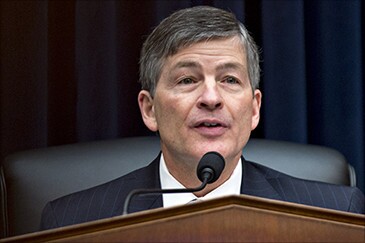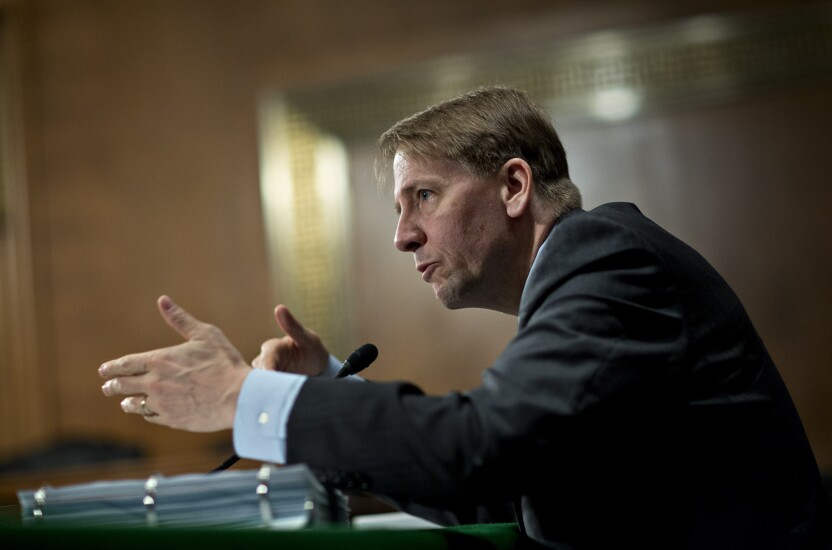
During the past two months, the agency has suffered a series of setbacks. Lawmakers scrapped one of its key rules and are aiming at another; its leader quit and his hand-picked successor is waging a legal battle to try and get control of the agency; the Trump administration's choice for interim agency head has signaled he intends drastic changes; and the Government Accountability Office just
While part time Acting Director Mick Mulvaney (he also runs the Office of Management and Budget) has pledged not to shut down the agency, he has made his disdain clear for many of its past activities.
“You could imagine that the Office of Management and Budget under the Trump administration might look very cautiously, even cynically, against rules that were produced by" former CFPB Director Richard Cordray, Mulvaney said.
Mulvaney said he's not sure what the agency will focus on next.
“I am trying to figure out how to articulate how things are going to be different,” he told reporters. “That is really what I need to set aside some time to do fairly quickly.”
Whatever it is, it's liable to look significantly different. Following are some of the defeats suffered by the CFPB in recent weeks — and others that may still be in the works.

Indirect auto lending guidance
The finding was significant, as it means the guidance cannot be enforced until it is resubmitted to Congress — something unlikely to happen now that Mulvaney is in control. Even if the CFPB did rebsubmit it, Sen. Pat Toomey, R-Pa., and other Republicans would likely muster enough votes to repeal the rule under the Congressional Review Act, a process that allows lawmakers to scrap recent regulations via a majority vote.
The defeat of the guidance was a significant blow to the agency, which had sought to gain control over auto lending even though the Dodd-Frank Act specifically barred it from going after auto dealers.

Arbitration rule
The move, via the Congressional Review Act, doesn't just scrap the rule. It also prevents the CFPB from taking action against mandatory arbitration clauses in the future unless lawmakers expressly allow it.
When Senate Banking Committee Chairman Mike Crapo first announced the effort against the arbitration rule, it wasn't clear he would have enough votes. Key GOP senators like Lindsey Graham, R-S.C., and John Kennedy, R-La., defected, but Vice President Mike Pence cast the tie-breaking vote to push it over the finish line.
That move ranks as one of the financial industry's

Payday lending?
Though it's not clear this one will prevail, the fact that Democrats signed on to it is a bad sign for the CFPB, which typically has been fiercely protected by that party. It is also being actively pushed by House Financial Services Committee Chairman Jeb Hensarling, an outspoken critic of the agency.
Congress only has a short window remaining to overturn the rule, and precious little time in the legislative calendar, but the effort received a boost this week after Mulvaney
“I would support the Congress to move forward with the” Congressional Review Act, said Mulvaney, a former South Carolina congressman.

A leadership battle
For now, Mulvaney is in charge after a federal judge declined to grant a temporary restraining order brought by CFPB Deputy Director Leandra English. Another hearing
The entire episode, however, has put CFPB under a cloud,

A challenge to CFPB's independence?
Mulvaney has attempted to dismiss those concerns, saying he’s just as independent from President Trump as Richard Cordray was from President Obama. Some took that answer not as an affirmation of Mulvaney’s independence, but rather as a critique of the perception of Cordray’s autonomy.
Indeed, speaking this week to reporters, Mulvaney said he wanted to bring in more political appointees into the agency, something that could further compromise the perception of the agency's independence.
For "every major branch of CFPB — enforcement, rulemaking, education, legal, maybe somebody in the Northeast division, somebody in the Southeast division, somebody out West" — Mulvaney said he would "try to marry [that branch's] senior staffer ... up with a political position."
The plan has





